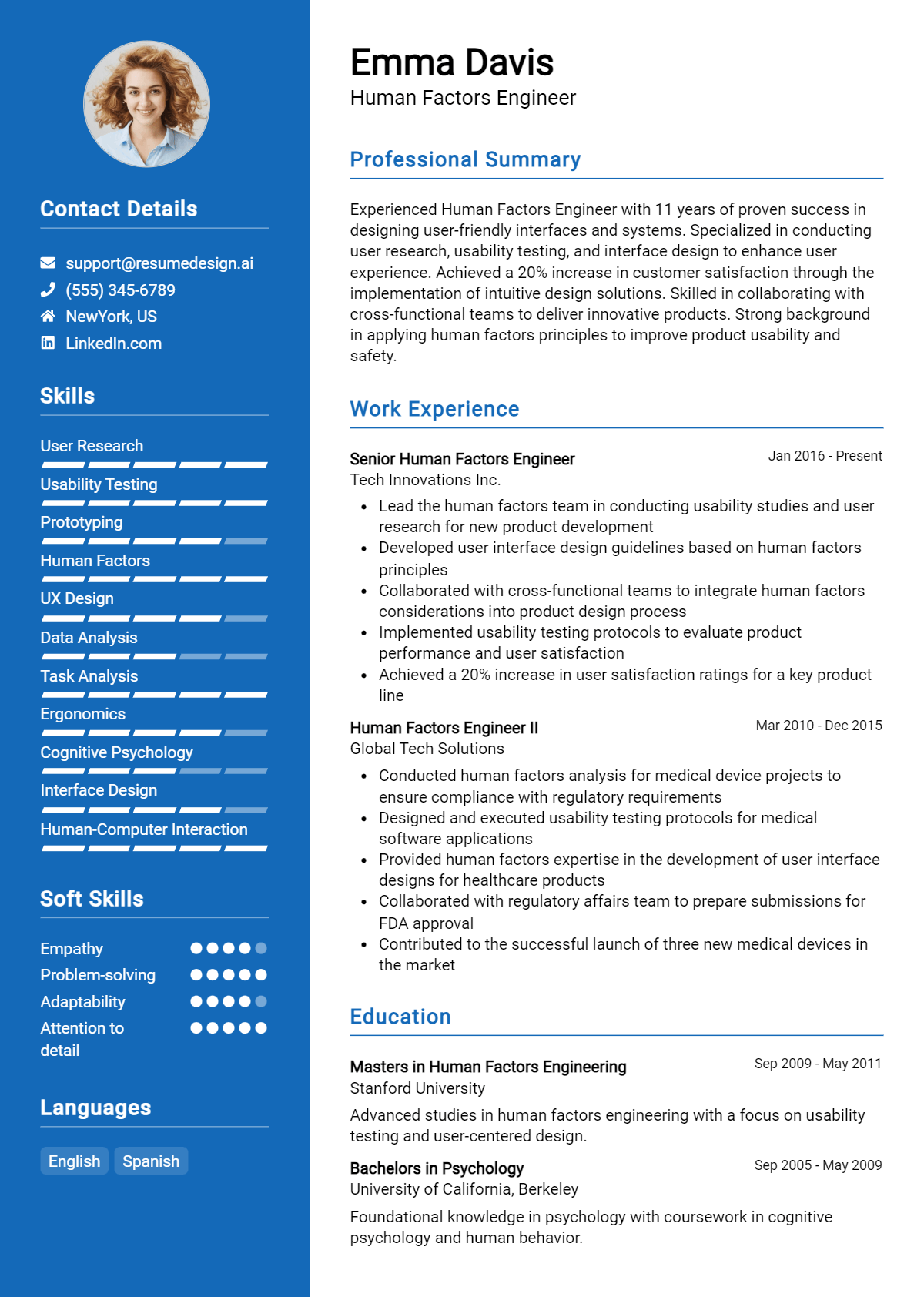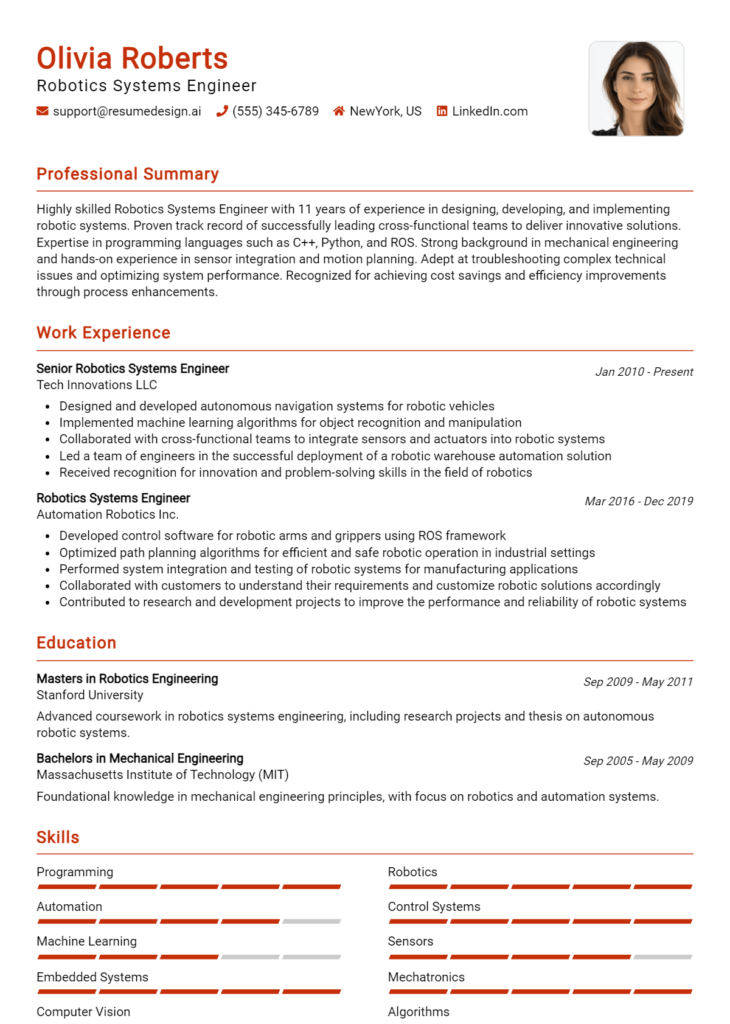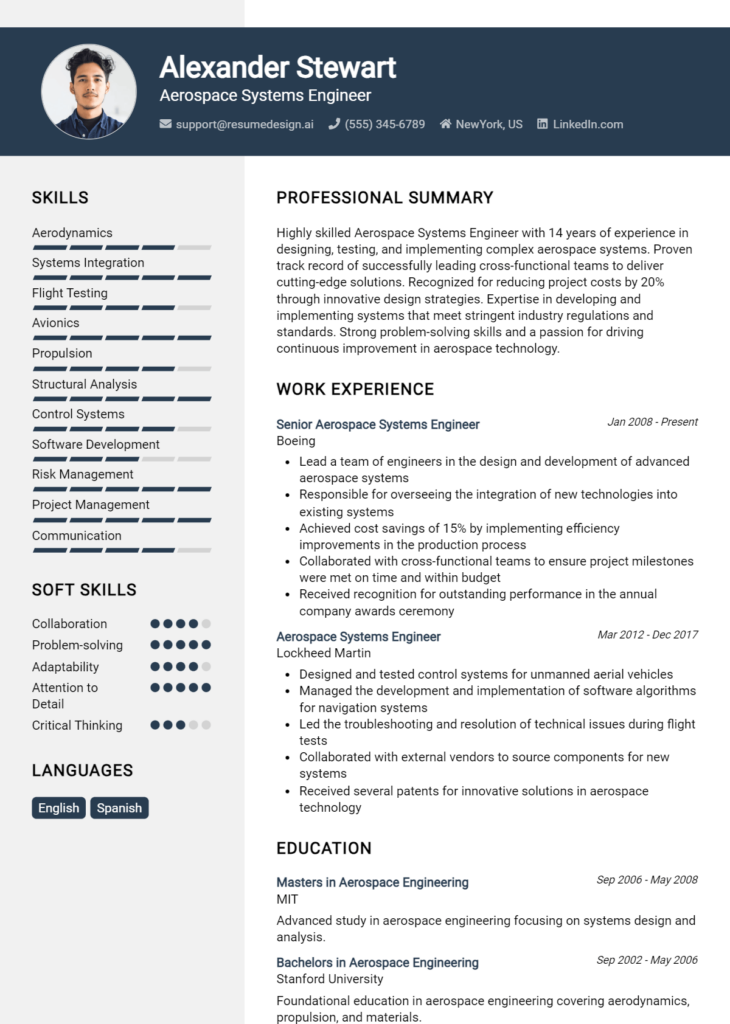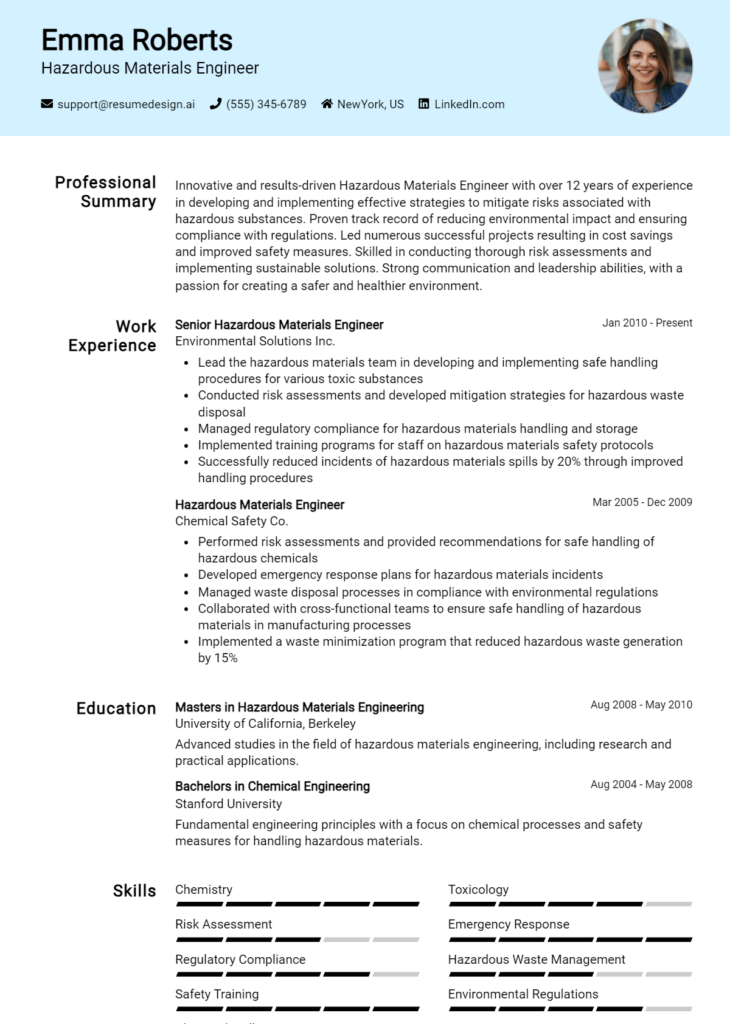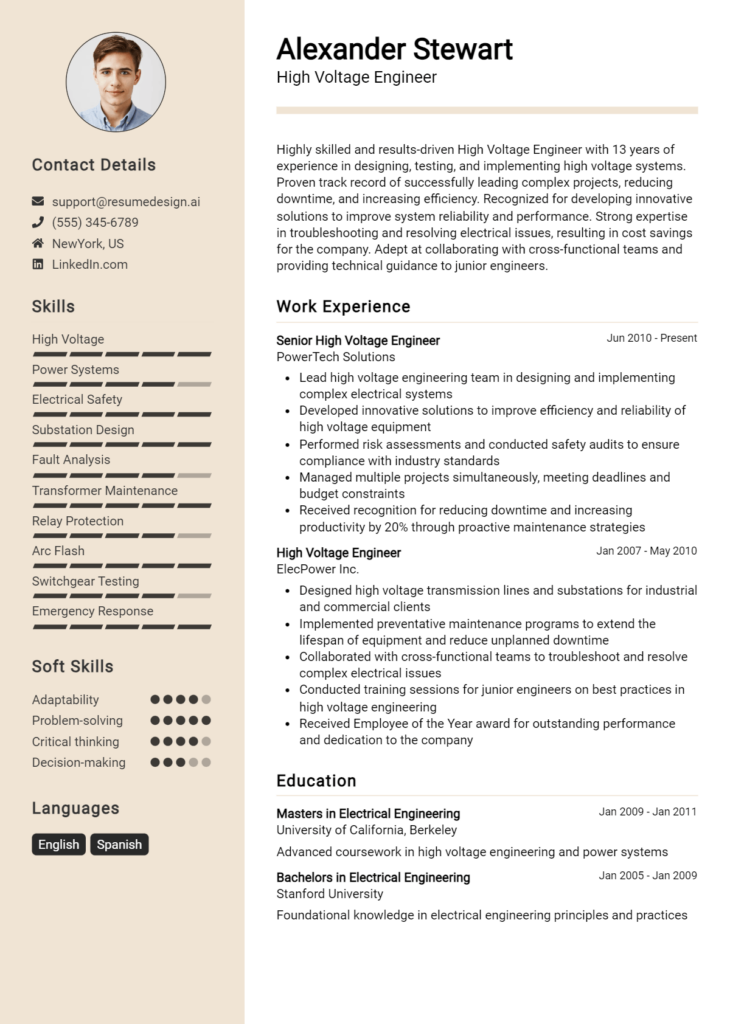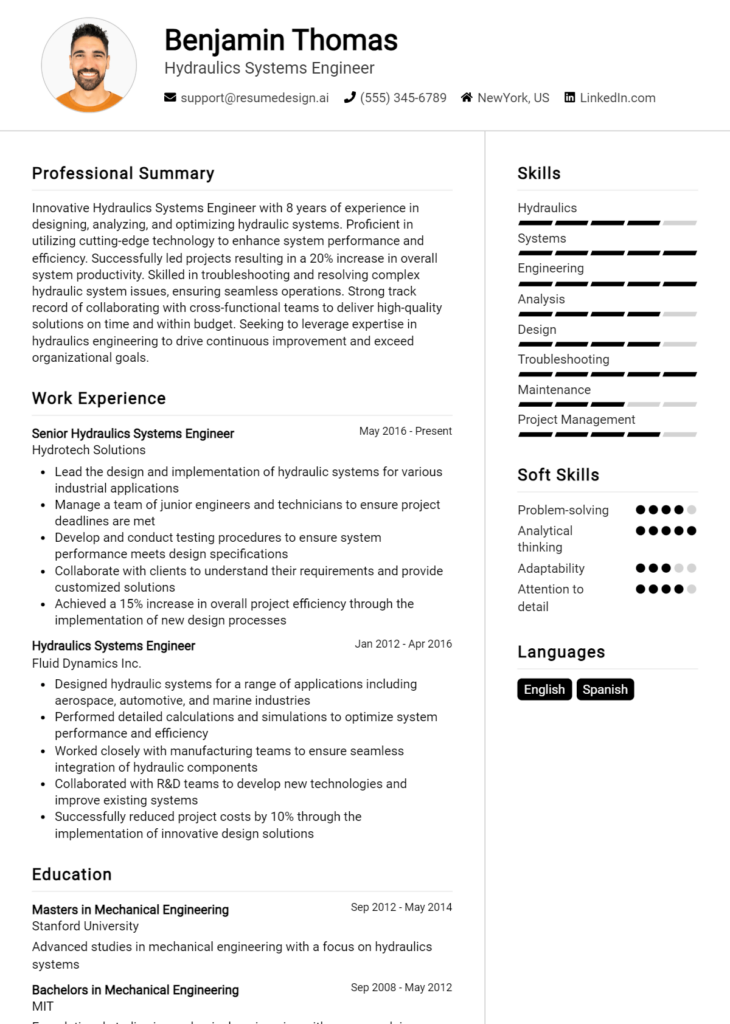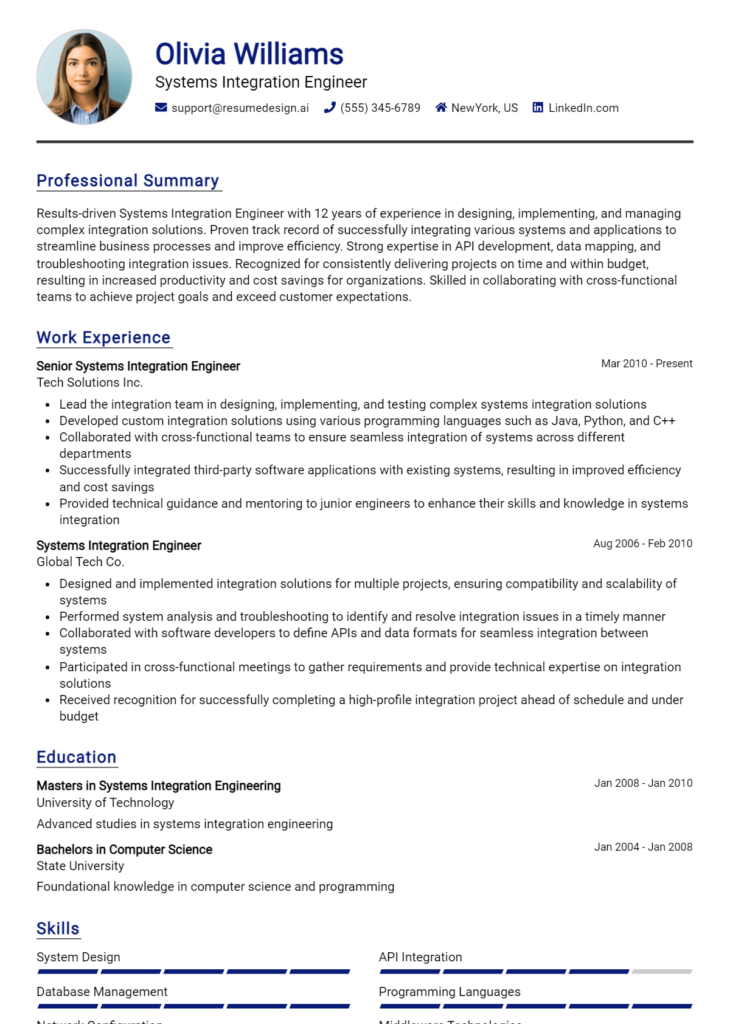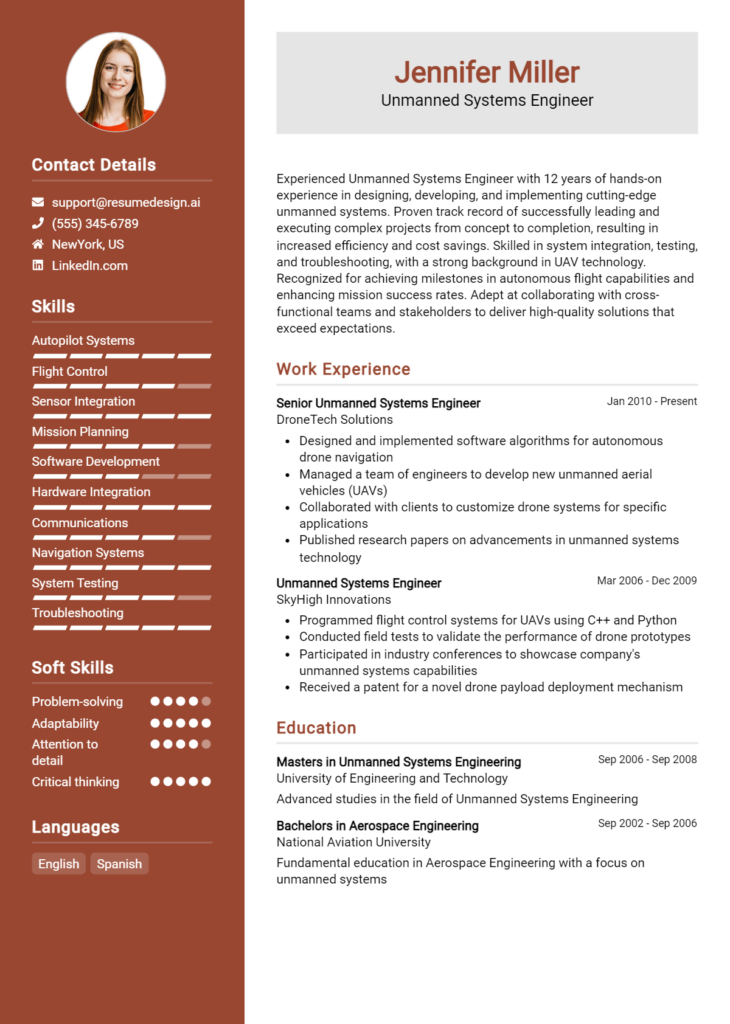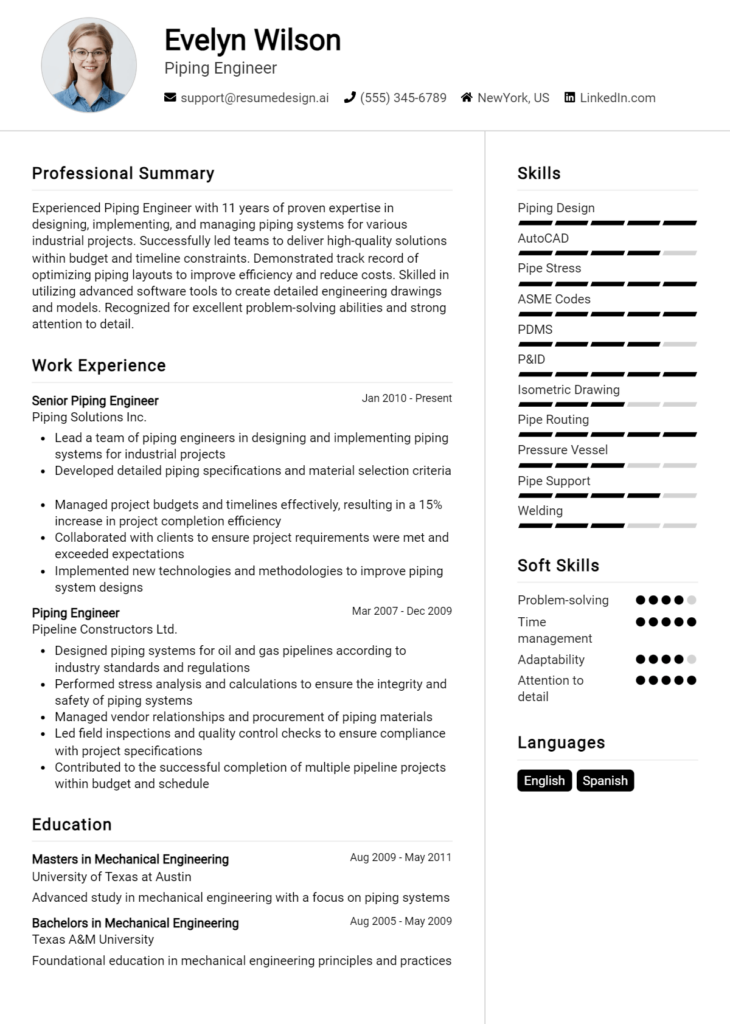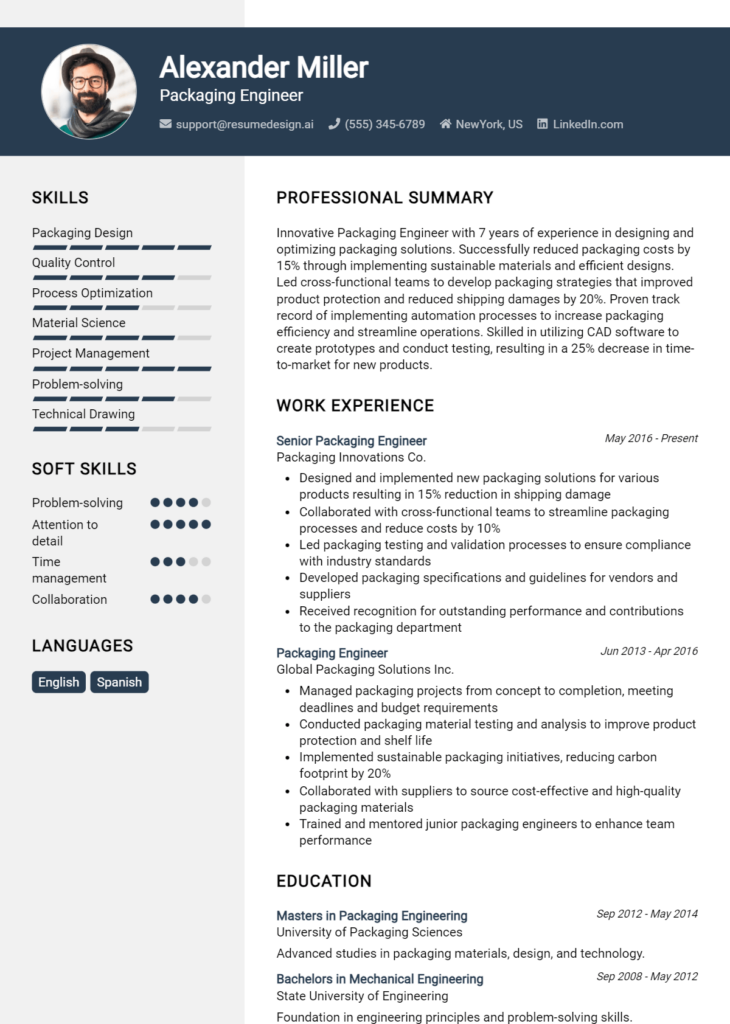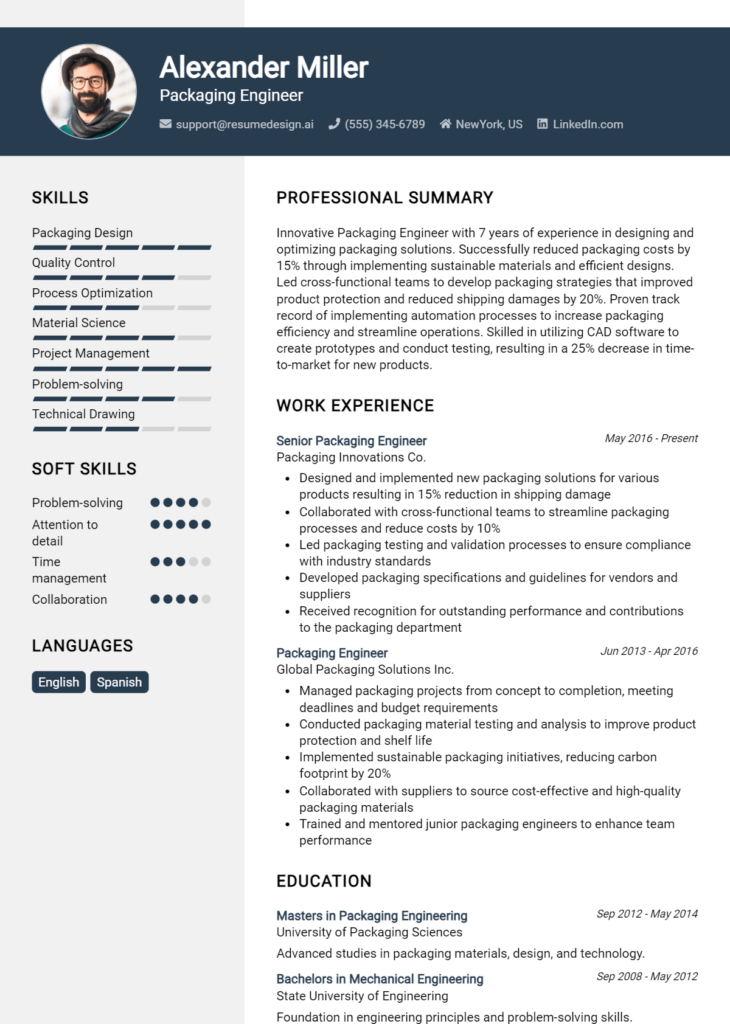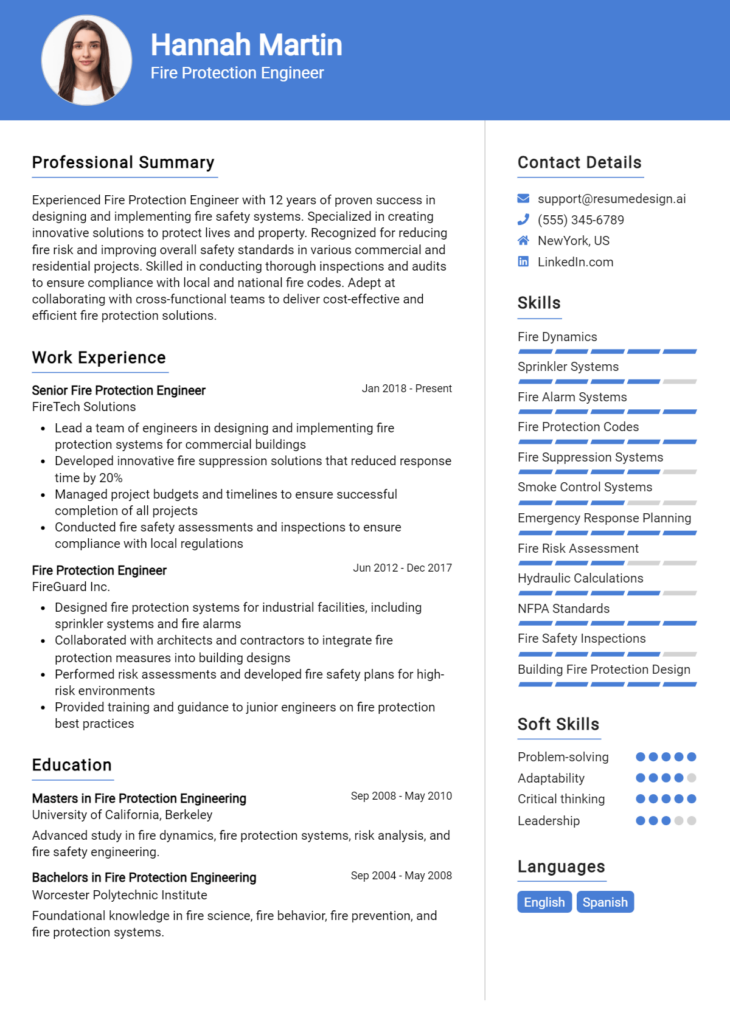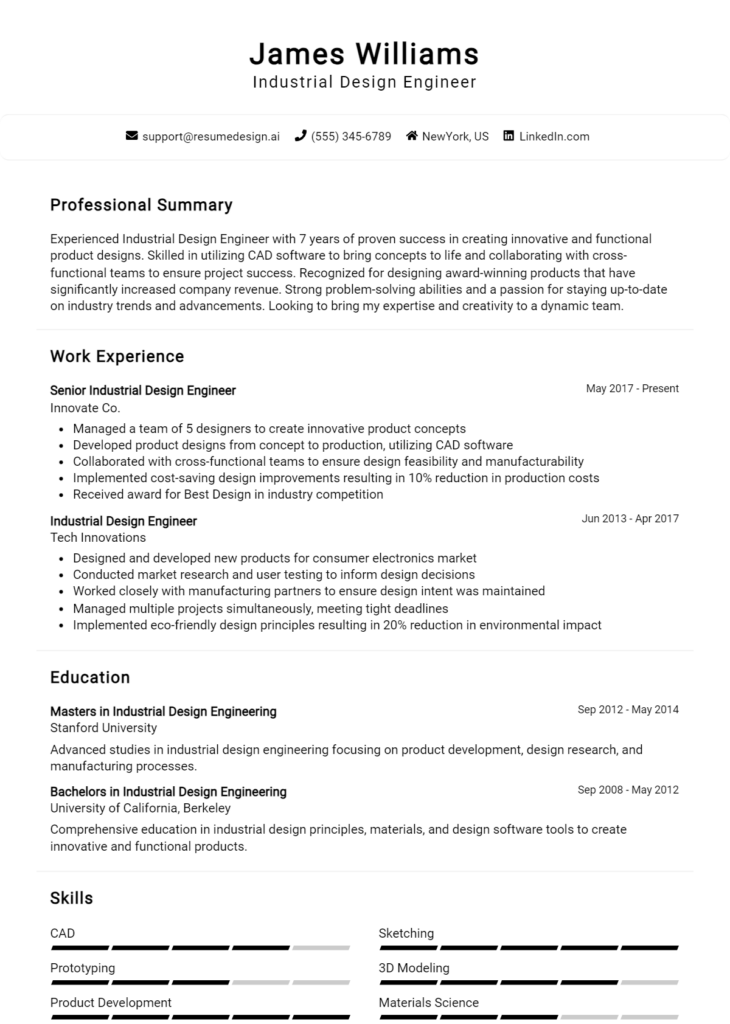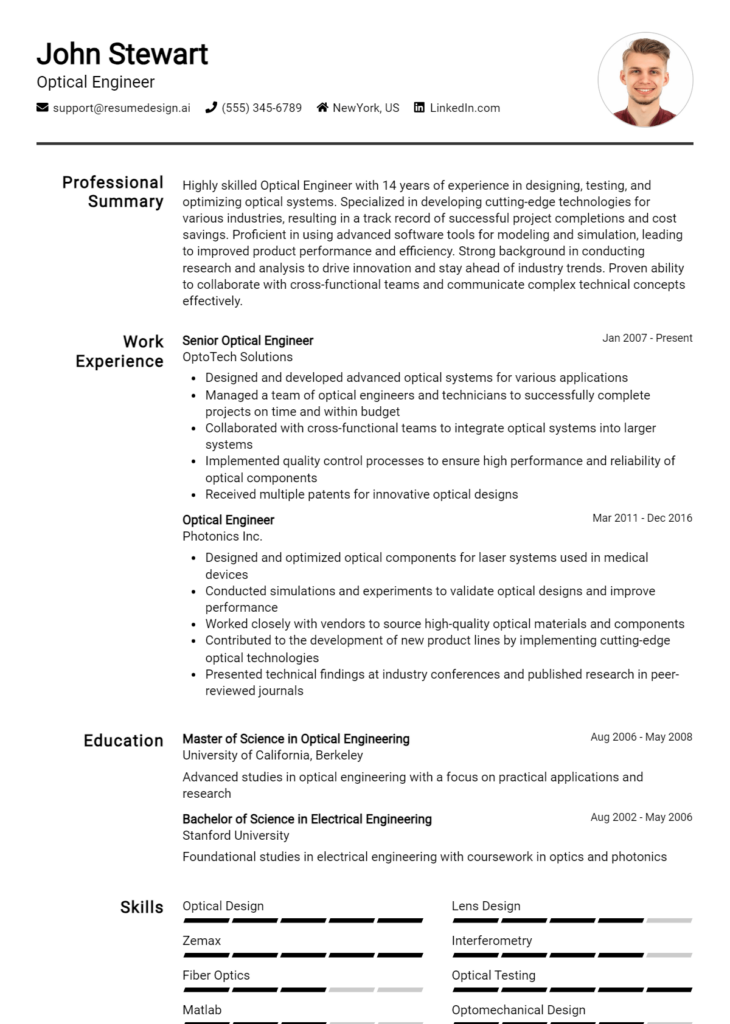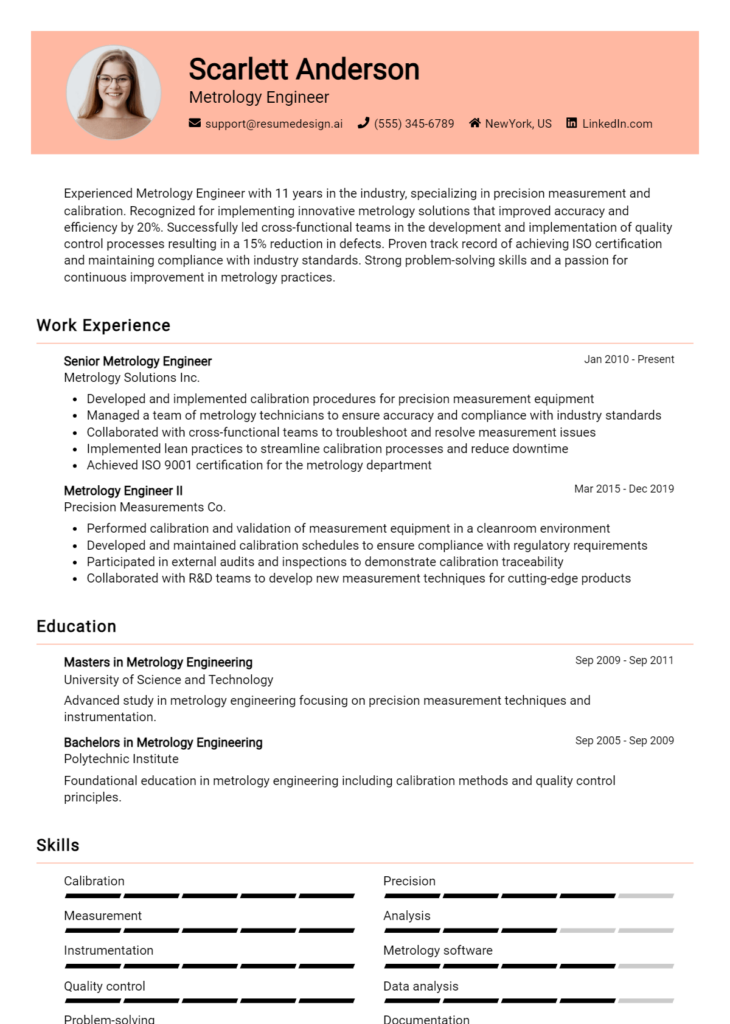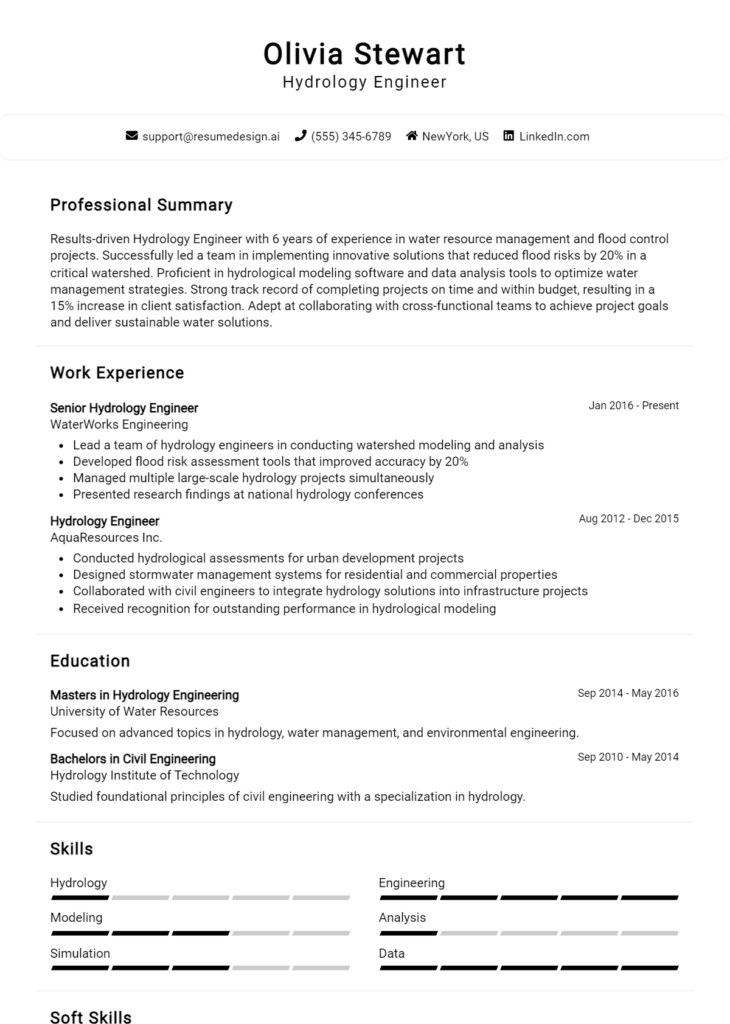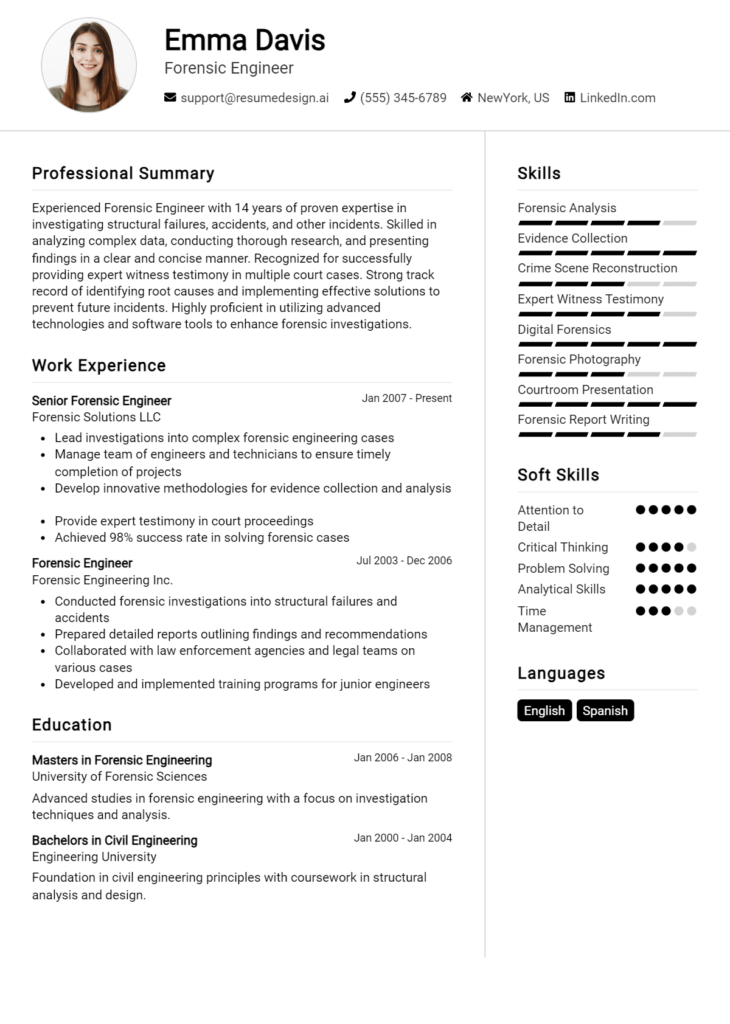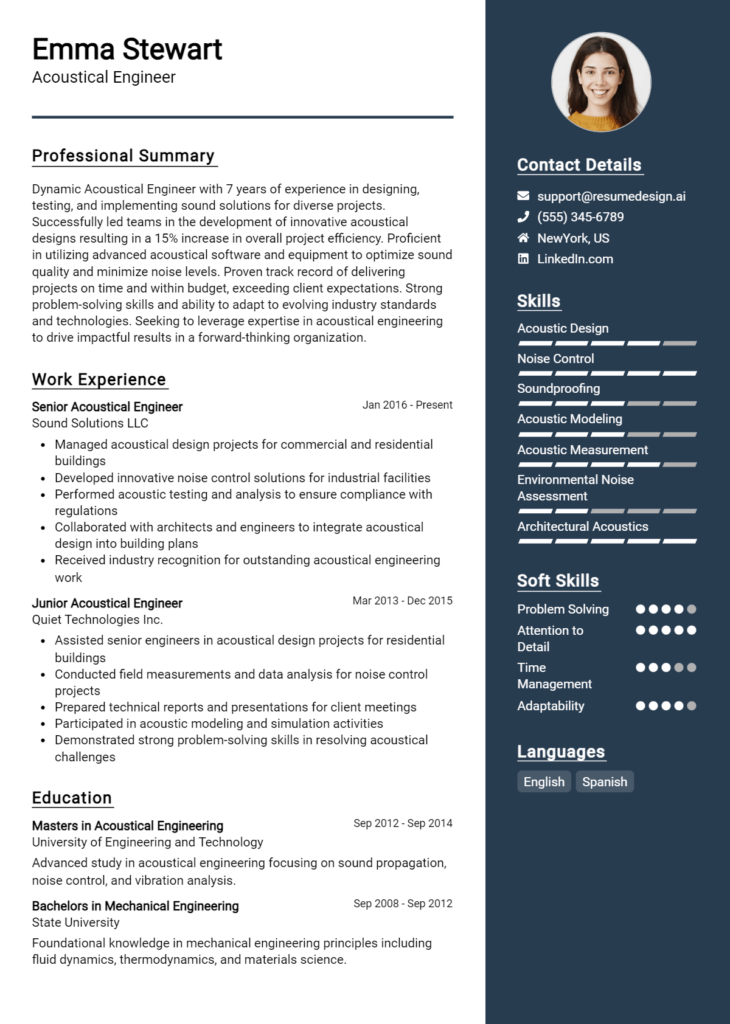Human Factors Engineer Core Responsibilities
A Human Factors Engineer plays a critical role in enhancing user experience by analyzing how people interact with systems and products. Key responsibilities include conducting usability testing, designing user interfaces, and collaborating across departments such as engineering, design, and marketing. Essential skills include technical expertise, operational knowledge, and strong problem-solving abilities. These competencies significantly contribute to achieving organizational goals by ensuring products are user-friendly and effective. A well-structured resume can effectively highlight these qualifications, showcasing the engineer's impact on overall project success.
Common Responsibilities Listed on Human Factors Engineer Resume
- Conduct usability assessments and user research to gather insights.
- Design and develop user-centered interfaces for various products.
- Collaborate with cross-functional teams to identify design requirements.
- Analyze user behavior and feedback to improve product design.
- Create prototypes and conduct iterative testing for enhancements.
- Develop guidelines and standards for user interface design.
- Present findings and recommendations to stakeholders.
- Ensure compliance with industry regulations and best practices.
- Facilitate training sessions on user-centered design principles.
- Document design processes and user testing results.
High-Level Resume Tips for Human Factors Engineer Professionals
In the competitive field of Human Factors Engineering, a well-crafted resume is not just a document—it's your first opportunity to make a lasting impression on potential employers. This critical tool should effectively showcase both your technical skills and professional achievements, reflecting the unique blend of expertise that defines a successful Human Factors Engineer. As you navigate your career path, remember that your resume is often the key that opens the door to interviews and job offers. In this guide, we will provide practical and actionable resume tips specifically tailored for Human Factors Engineer professionals, ensuring your qualifications stand out in a crowded job market.
Top Resume Tips for Human Factors Engineer Professionals
- Tailor your resume to each job description, emphasizing relevant skills and experiences that align with the specific role.
- Highlight industry-specific skills such as usability testing, user research, and ergonomic design to demonstrate your expertise.
- Quantify your achievements with specific metrics, such as improved user satisfaction scores or reduced error rates, to showcase your impact.
- Include relevant certifications and training, such as Human Factors and Ergonomics Society (HFES) certification, to enhance your credibility.
- Utilize clear and concise language, avoiding jargon that may not be familiar to all hiring managers.
- Incorporate a professional summary at the beginning of your resume that encapsulates your experience and career objectives.
- Showcase your experience with cross-functional teams, emphasizing collaboration and communication skills that are vital in Human Factors Engineering.
- Use action verbs to describe your responsibilities and achievements, making your contributions more dynamic and engaging.
- Keep your resume visually appealing and well-organized, using consistent formatting and headings to enhance readability.
- Include a section for relevant publications or presentations that showcase your thought leadership in the field.
By implementing these tips, you can significantly increase your chances of landing a job in the Human Factors Engineer field. A targeted and polished resume not only highlights your qualifications but also demonstrates your professionalism and attention to detail, making you a more attractive candidate to potential employers.
Why Resume Headlines & Titles are Important for Human Factors Engineer
In the competitive field of Human Factors Engineering, a well-crafted resume headline or title is crucial for making a lasting first impression. A strong headline encapsulates the essence of a candidate's professional identity, highlighting their key qualifications and experiences in a succinct manner. This immediate attention grabber not only draws in hiring managers but also provides a quick summary of what the candidate brings to the table, setting the tone for the rest of the resume. It should be concise, relevant, and specifically aligned with the job being applied for, ensuring it resonates with the expectations of the employer.
Best Practices for Crafting Resume Headlines for Human Factors Engineer
- Keep it concise—aim for one impactful phrase.
- Use role-specific keywords that align with the job description.
- Highlight key skills or areas of expertise relevant to Human Factors Engineering.
- Incorporate quantifiable achievements or experiences when possible.
- Avoid jargon or overly technical terms that may confuse the reader.
- Make it compelling by showcasing unique value propositions.
- Tailor the headline for each application to reflect the specific job requirements.
- Use active language to convey confidence and professionalism.
Example Resume Headlines for Human Factors Engineer
Strong Resume Headlines
Innovative Human Factors Engineer Specializing in User-Centered Design Solutions
Data-Driven Human Factors Specialist with 5+ Years of Experience Enhancing Usability
Human Factors Engineer with Proven Track Record in Cross-Functional Team Collaboration
Expert in Ergonomics and Usability Testing for Enhanced Product Development
Weak Resume Headlines
Engineer with Some Experience
Seeking a Position in Engineering
The strong headlines stand out because they clearly articulate the candidate's expertise, experience, and unique strengths in a way that aligns with the expectations of the hiring manager. They utilize specific terminology and quantitative achievements, making it easy for employers to see the value the candidate can bring. In contrast, the weak headlines lack specificity and fail to convey any meaningful insights about the candidate, making them forgettable and unimpressive. A strong headline not only captures attention but also invites the reader to learn more about the candidate's qualifications, setting a positive tone for the entire resume.
Writing an Exceptional Human Factors Engineer Resume Summary
A resume summary is a crucial element for a Human Factors Engineer as it serves as the first impression for hiring managers. An exceptional summary quickly captures attention by effectively showcasing key skills, relevant experience, and notable accomplishments that directly align with the job role. In a competitive job market, a strong summary should be concise and impactful, tailored specifically to the position the candidate is applying for, ensuring that it highlights their unique value proposition and expertise in enhancing user-centered design and usability.
Best Practices for Writing a Human Factors Engineer Resume Summary
- Quantify Achievements: Use specific numbers and metrics to demonstrate the impact of your work.
- Focus on Relevant Skills: Highlight skills that are directly applicable to the job description.
- Tailor for the Job Description: Customize your summary to reflect the requirements and preferences outlined in the job posting.
- Keep It Concise: Aim for 2-4 sentences that succinctly convey your qualifications without unnecessary fluff.
- Use Action-Oriented Language: Start sentences with strong action verbs to convey confidence and proactivity.
- Highlight Unique Contributions: Mention any unique methodologies or approaches you have implemented that set you apart.
- Showcase Industry Knowledge: Incorporate specific terminology or frameworks relevant to the human factors and ergonomics field.
- Reflect Your Passion: Convey your enthusiasm for improving user experiences and product usability.
Example Human Factors Engineer Resume Summaries
Strong Resume Summaries
Results-driven Human Factors Engineer with over 5 years of experience in user research and usability testing, leading to a 30% increase in user satisfaction scores for a leading tech company. Proficient in employing user-centered design principles and conducting A/B testing to inform design decisions.
Detail-oriented Human Factors professional with a proven track record in optimizing product interfaces, achieving a 40% reduction in user errors for a healthcare application. Skilled in collaborating with cross-functional teams to deliver user-centric solutions using ISO 9241 standards.
Innovative Human Factors Engineer with expertise in ergonomic design, successfully implementing usability improvements that boosted product adoption by 25% within six months. Strong analytical skills in assessing user interactions and identifying areas for enhancement.
Weak Resume Summaries
Human Factors Engineer with experience in various projects. Good at working with teams and improving designs.
Dedicated professional in Human Factors looking for opportunities to apply skills in usability and user experience.
The examples provided illustrate why certain summaries are considered strong or weak. Strong summaries are effective because they include quantifiable results, relevant skills, and specific contributions that align with the Human Factors Engineer role. In contrast, weak summaries lack detail, specificity, and clear outcomes, which may lead hiring managers to overlook the candidate's potential. A compelling summary should clearly articulate the candidate's value and relevance to the position, making it a vital component of any resume.
Work Experience Section for Human Factors Engineer Resume
The work experience section of a Human Factors Engineer resume plays a pivotal role in demonstrating the candidate's technical skills, team management capabilities, and their ability to deliver high-quality products. This section not only highlights the hands-on experience relevant to human factors engineering but also provides concrete evidence of the candidate's contributions to their previous organizations. Quantifying achievements, such as improved user satisfaction scores or reduced error rates, is essential to illustrate impact. Additionally, aligning this experience with industry standards ensures that the candidate's skills and achievements resonate with potential employers, making this section a crucial element of a compelling resume.
Best Practices for Human Factors Engineer Work Experience
- Use action verbs to describe your role and contributions clearly.
- Quantify your achievements with metrics, such as percentage increases or dollar savings.
- Highlight specific projects that demonstrate your technical expertise and problem-solving skills.
- Showcase collaboration by mentioning cross-functional teams and stakeholder engagement.
- Align your experiences with industry standards and best practices to enhance relevance.
- Focus on results-driven statements that illustrate the impact of your work.
- Include any leadership roles or mentorship experiences to demonstrate your team management capabilities.
- Tailor your work experience section for each job application to match the job description.
Example Work Experiences for Human Factors Engineer
Strong Experiences
- Led a cross-functional team to redesign a medical device, resulting in a 30% reduction in user error rates and a 20% increase in overall user satisfaction as measured by post-launch surveys.
- Developed and implemented a usability testing protocol that identified critical design flaws, saving the company over $250,000 in potential product recalls.
- Collaborated with software engineers and designers to create a user interface that improved task completion time by 40%, enhancing overall product usability.
- Managed a team of junior engineers in a project that successfully integrated user feedback into the product lifecycle, leading to a 25% improvement in user engagement metrics.
Weak Experiences
- Worked on various projects without specifying the outcomes or contributions to the team.
- Assisted in usability testing but did not describe any specific results or improvements.
- Collaborated with others on design work, but details of the collaboration and impact are vague.
- Involved in engineering tasks without highlighting any leadership or technical expertise.
The examples of strong experiences are considered effective because they clearly demonstrate quantifiable outcomes, illustrate technical leadership, and highlight collaboration within teams. Each point specifies the impact of the candidate's work, using metrics to back up claims. In contrast, the weak experiences lack detail and fail to convey the significance of the candidate's contributions, making them less compelling to potential employers.
Education and Certifications Section for Human Factors Engineer Resume
The education and certifications section of a Human Factors Engineer resume plays a crucial role in establishing a candidate's qualifications and expertise in the field. This section not only showcases the candidate's academic background but also emphasizes industry-relevant certifications and commitment to continuous learning. By including pertinent coursework, recognized certifications, and specialized training, candidates can significantly enhance their credibility and demonstrate alignment with the specific requirements of the Human Factors Engineer role. This information provides potential employers with valuable insights into the candidate's preparedness to address the complexities of human interaction with systems and products.
Best Practices for Human Factors Engineer Education and Certifications
- Include degrees related to Human Factors, Ergonomics, Psychology, or Engineering.
- Highlight certifications from recognized organizations, such as the Human Factors and Ergonomics Society (HFES).
- Provide details about relevant coursework that aligns with job responsibilities, such as Usability Testing or Human-Computer Interaction.
- List any specialized training programs or workshops attended that are pertinent to human factors engineering.
- Use clear formatting to make this section easy to read and understand.
- Prioritize recent and relevant credentials over older qualifications.
- Consider including GPA or honors if they reinforce your academic excellence.
- Tailor the section to the specific job description to highlight the most relevant qualifications.
Example Education and Certifications for Human Factors Engineer
Strong Examples
- M.S. in Human Factors and Ergonomics, University of California, 2021
- Certified Usability Analyst (CUA), Human Factors International, 2022
- Graduate Coursework in Cognitive Psychology, focusing on Human-Computer Interaction, 2020
- B.S. in Industrial Engineering with a specialization in Ergonomics, Georgia Tech, 2019
Weak Examples
- B.A. in History, State University, 2010
- Certification in Microsoft Office Suite, 2015
- High School Diploma, 2008
- Outdated CPR Certification, expired 2020
The strong examples are considered effective because they showcase relevant degrees and certifications that directly relate to the Human Factors Engineer role, demonstrating both expertise and specialization. In contrast, the weak examples highlight irrelevant or outdated qualifications that do not pertain to the demands of the position, thereby diminishing the candidate's perceived suitability for the role.
Top Skills & Keywords for Human Factors Engineer Resume
As a Human Factors Engineer, showcasing the right skills on your resume is crucial for attracting potential employers and demonstrating your expertise in the field. Human Factors Engineering is a multidisciplinary practice that focuses on understanding the interactions between humans and systems, ensuring user-centered designs that enhance usability, safety, and performance. Highlighting both hard and soft skills effectively can set you apart from other candidates, illustrating your capability to analyze complex systems and contribute to the design process in a meaningful way. A well-crafted resume that emphasizes these skills can significantly improve your chances of landing an interview and advancing your career in this specialized field.
Top Hard & Soft Skills for Human Factors Engineer
Soft Skills
- Communication Skills
- Problem Solving
- Team Collaboration
- Critical Thinking
- Attention to Detail
- Adaptability
- Empathy
- Time Management
- Creativity
- Analytical Skills
- User-Centric Mindset
- Conflict Resolution
- Project Management
- Active Listening
- Interpersonal Skills
- Flexibility
- Cultural Awareness
Hard Skills
- Usability Testing
- Human-Computer Interaction (HCI)
- Ergonomics
- Prototyping
- Data Analysis
- User Research Methods
- Software Proficiency (e.g., MATLAB, Sketch)
- Statistical Analysis
- Design Thinking
- Risk Assessment
- Cognitive Psychology
- System Design
- Accessibility Standards
- Simulation Modeling
- Technical Writing
- Regulatory Compliance
- Design Validation Techniques
Incorporating these essential skills into your resume, alongside a robust work experience section, will help present a comprehensive picture of your qualifications and readiness for the role of a Human Factors Engineer.
Stand Out with a Winning Human Factors Engineer Cover Letter
I am writing to express my interest in the Human Factors Engineer position at [Company Name], as advertised on [Job Board/Company Website]. With a solid foundation in ergonomics, cognitive psychology, and user-centered design, I am excited about the opportunity to contribute to your team by enhancing user experiences and improving product usability. My educational background in Human Factors Engineering, combined with hands-on experience in conducting usability studies and designing user interfaces, positions me as a strong candidate for this role.
In my previous role at [Previous Company Name], I successfully led multiple projects aimed at optimizing product designs based on user feedback and behavioral analysis. By employing various research methodologies, including usability testing and user interviews, I was able to identify critical pain points and recommend actionable design improvements. My collaborative approach allowed me to work closely with cross-functional teams including designers, engineers, and project managers, ensuring that human factors were consistently integrated into the product development process. I am particularly proud of a project where my insights led to a 25% increase in user satisfaction ratings, demonstrating the tangible impact of applying human factors principles.
I am particularly drawn to [Company Name] because of your commitment to innovation and user-centric design. I admire your recent projects, especially [specific project or product related to Human Factors], and I believe my expertise in user research and product testing aligns perfectly with your mission to create intuitive and effective solutions. I am eager to bring my passion for understanding user needs and translating them into successful product designs to your talented team.
Thank you for considering my application. I am looking forward to the opportunity to discuss how my skills and experiences can contribute to the exciting work being done at [Company Name]. Please feel free to contact me at [Your Phone Number] or [Your Email Address] to schedule a conversation. I am enthusiastic about the possibility of joining your team and contributing to projects that prioritize human-centered design.
Common Mistakes to Avoid in a Human Factors Engineer Resume
When crafting a resume for a Human Factors Engineer position, it's crucial to present your skills and experiences effectively to stand out in a competitive job market. However, many candidates make common mistakes that can hinder their chances of landing an interview. Avoiding these pitfalls can significantly enhance the impact of your resume and showcase your qualifications in the best possible light.
Lack of Tailoring: Failing to customize your resume for the specific job description can lead to missed opportunities. Each position may require different skills and experiences, so tailoring your resume shows attention to detail and alignment with the role.
Overloading with Technical Jargon: While technical expertise is essential, overloading your resume with jargon can alienate hiring managers who may not be familiar with every term. Aim for clarity and balance in your descriptions.
Ignoring Soft Skills: Human Factors Engineering often requires collaboration and communication skills. Neglecting to highlight soft skills, such as teamwork and problem-solving, can give a one-dimensional view of your capabilities.
Vague Accomplishments: Simply listing responsibilities without quantifying accomplishments can weaken your impact. Use specific metrics and examples to illustrate your contributions, such as "improved user satisfaction by 30% through design revisions."
Inconsistent Formatting: A cluttered or inconsistent format can distract from your content. Ensure that fonts, bullet points, and spacing are uniform throughout the resume to enhance readability.
Omitting Relevant Certifications: Certifications related to Human Factors Engineering, such as those from professional organizations, can set you apart. Be sure to include any relevant credentials prominently on your resume.
Lack of a Professional Summary: Failing to include a concise professional summary at the beginning of your resume can make it harder for hiring managers to quickly understand your qualifications. A strong summary should encapsulate your experience, skills, and career goals.
Neglecting to Update: An outdated resume can misrepresent your current skills and experiences. Regularly updating your resume to reflect your most recent roles and accomplishments is essential for keeping it relevant.
Conclusion
As we explored the essential responsibilities and skills required for a Human Factors Engineer, it became clear that this role is pivotal in designing systems and products that enhance user experience and safety. Key aspects include understanding user needs, applying ergonomic principles, conducting usability testing, and collaborating with multidisciplinary teams.
To stand out in this competitive field, it's vital to present a well-crafted resume that highlights your unique qualifications and experience. Whether you’re just starting out or looking to advance your career, a polished resume can make all the difference.
Now is the perfect time to reassess your Human Factors Engineer resume. Utilize available resources to enhance your job application materials. Check out resume templates to find a design that suits your style, or use the resume builder for a step-by-step approach to crafting your document. If you need inspiration, explore resume examples that showcase various formats and content tailored for Human Factors Engineers. Additionally, don’t forget to enhance your applications with effective cover letter templates that convey your enthusiasm and suitability for the role.
Take action today—revamp your resume and position yourself for success in the field of Human Factors Engineering!

